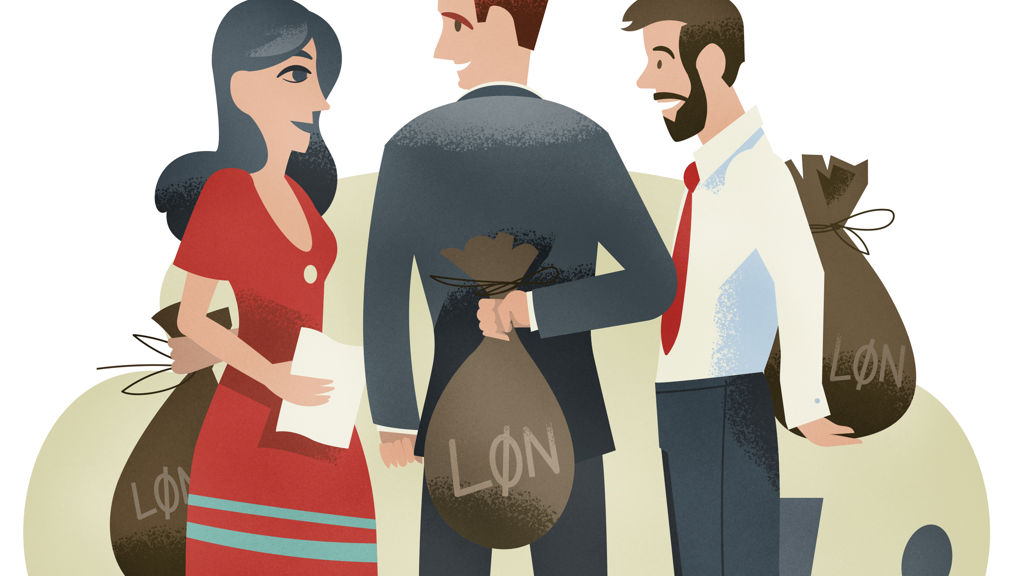Salary: The taboo that never disappears
For years, it has been taboo to talk pay with colleagues and friends. Why does this remain the case when trade unions have been screaming for more openness for years? Get answers from a researcher in industrial relations and chief consultant from the Institute for Human Rights. And perhaps we are seeing a minor change in salary talk in the years ahead?
More openness and transparency about wages have been a great mantra for trade unions and employee organisations for years, because more openness benefits the individual employee and will eventually create a fairer wage structure, says
Because when the employer has all the aces in hand in the form of salary information on the employees and the employees do not show the cards to each other, it creates an unequal distribution of knowledge. This leaves the employees with a bad hand.
Yet it is a difficult discussion for employees to start up in the workplace and headlines like ”wages are more taboo than sex at work” find year after year until the newspaper slips. We have difficulty talking about how we pay for our work.
Anders Raastrup Kristensen, researcher in the Danish labour market, and Morten Emmerik Wøldike, chief consultant at the Institute for Human Rights, tries to provide an explanation.

Legislation, emotions and culture
To understand the lack of openness, we need to address legislation, emotions and culture in Danish workplaces.
We start with the legislation, because it is actually quickly over. There is no legislation that speaks against openness about pay. You have the right to talk about your salary with anyone you want to
It immediately becomes a little harder when we speak it emotionally.
”It talks about: What am I really worth as a labour force, and am I now as skilled as my colleagues? It's a difficult discussion just to go across the coffee machine. We use salary as a yardstick for our success”, says Anders Raastrup Kristensen.
A few years ago, the Institute for Human Rights published a report showing that 60 percent do not talk pay with their colleagues. 40 percent indicate that they would wish it to be normal to talk pay.
”Traditionally, wages have been seen as a private matter and something personal and inappropriate to talk about – neither with colleagues nor friends. Wages and money have been something you have kept for yourself and did not sign up”, says Morten Emmerik Wøldike.
Viser ikke udbytte af vores investering
I forhold til det kulturelle aspekt, uddyber Morten Emmerik Wøldike.
”For de fleste udgør arbejdslivet en meget vigtig del af identiteten. Vi investerer mange år i starten af voksenlivet på at dygtiggøre og uddanne os for at træde ind på arbejdsmarkedet. Løn er jo en nødvendig del af det, der kommer ud af at have et arbejde, men når løn stilles op over for andres løn, kommer der meget mere på spil end bare kroner og ører. Det handler også om oplevelsen af ens egen menneskelige værdi, selvværd og om at lykkes med sit liv”.
Anders Raastrup Kristensen siger:
”Vi har en kultur, der ikke har forandret sig en millimeter de seneste mange år, og lovgivningen er ikke en barriere. Så måske der skal noget andet til. I Norge har de åbne skattelister, hvilket betyder at alle borgeres indtjening er offentlig tilgængelig viden. Om det er vejen frem, ved jeg ikke, men der får du en viden forærende. Men om det øger snakken om løn på arbejdspladsen, kan jeg godt stille mig tvivlende overfor”.
Does not show any dividends on our investment
In relation to the cultural aspect, Morten Emmerik Wøldike elaborates.
”For most people, working life forms a very important part of the identity. We invest many years at the beginning of adult life to educate and train us to enter the labour market. Pay is a necessary part of what comes out of having a job, but when pay is compared to other people's salaries, much more comes at stake than just money and ears. It is also about the experience of one’s own human value, self-esteem and success with one’s life.”
Anders Raastrup Kristensen says:
”We have a culture that has not changed a millimetre in the past many years, and legislation is not a barrier. So maybe something else needs to be done In Norway, they have open tax lists, which means that all citizens' earnings are publicly available knowledge. Whether that is the way forward, I don't know, but there you get a knowledge that is giving you a lesson. But whether it increases the talk about pay at the workplace, I can doubt”.
Are young people showing the way forward?
But perhaps there is just as quiet a cultural change coming in the form of younger generations entering the labour market.
”We see in other areas that young people are not so flaring about what they want to talk about. If younger colleagues in the workplace realise that it can be their advantage to speak wages because they typically will be among the lowest paid because of their age and seniority, then it may well be that: that we will see a more open wage culture flourishing in the coming years”, says Morten Emmerik Wøldike






